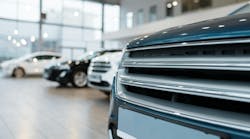A relatively modest number of gallons sold, along with a lack of activity at the pumps, suggest that E-85 fuel has been slow to catch on with customers since the fuel became available at three service stations on the Massachusetts Turnpike five months ago.
However, Ronald R. Sabia, president of Gulf Oil Limited Partnership at Cumberland Farms Inc., remains optimistic.
The Framingham-based company operates fuel stations at turnpike service stations for the state.
E-85 is used in flexible-fuel vehicles.
Single E-85 pumps are at the westbound service station in Charlton, which has sold 16,000 gallons to date; eastbound in Charlton, where 15,400 gallons have been sold; and westbound in Westboro, where 11,000 gallons have been sold, according to state Department of Transportation spokeswoman Sara Lavoie.
The DOT and Gulf installed three E-85 fuel tanks this summer. This essentially complied with a state law to offer alternative fuel on the turnpike by Jan. 1.
With a limited number of cars - about 100,000 registered in Massachusetts with flex-fuel capability - and E-85 a small portion of Gulf's business, Mr. Sabia said the gallons sold were ahead of expectations for the company.
A plan to add a fourth E-85 site on the turnpike remains on course, Mr. Sabia said. Following the lead of the state, Gulf is evaluating which turnpike site is most appropriate for the pumps, Mr. Sabia said.
"My guess is it would be an eastbound site because we have two headed westbound," he said.
E-85 reverses the traditional gasoline mixture; it's composed of 85 percent ethanol and 15 percent gasoline. Regular gasoline meets emission standards by adding about 10 percent ethanol to the mix.
The ethanol for the flexible fuel in the United States tends to be of corn stock because that type of sugar is processed in mass amounts here, Mr. Sabia said.
E-85 burns cleaner and reduces the use of fossil fuels, a nonrenewable resource that produces harmful emissions and is mostly bought at great expense from foreign sources.
E-85, Mr. Sabia said, can be made from any sugar, and in Brazil it is manufactured from sugar cane.
People are working on cellulosic ethanol, which will use everything from corn stocks and switch grass, he said.
In laymen's terms, it isn't much different from using grain to make alcohol, he said.
It is also less expensive than traditional gasoline.
E-85 fuel was $3.29 per gallon on the turnpike Friday, compared to $3.53 per gallon for regular unleaded gas and $4.11 for diesel fuel. On local area roads, gas was in the $3.40 per gallon range for regular unleaded.
At the eastbound pump in Charlton, the Telegram & Gazette, seeking to interview E-85 consumers, did not spot a single customer during a nearly three-hour stretch midday Friday.
According to the U.S. Environmental Protection Agency, Chrysler, Dodge, Ford, Jeep, Lincoln, Volkswagen, Mercedes and Bentley produce vehicles that burn E-85. Other manufacturers offer flex-fuel vehicles outside the U.S.
"You find oftentimes that even owners of the cars don't realize they have the capability to fuel E-85 in their car. So there's a bit of education we are ongoing, continuing to do," Mr. Sabia said.
Funding for the $600,000 effort to install four tanks was provided through the Federal Highway Administration's Congestion Mitigation and Air Quality Improvement Program.
The law that went into effect Jan. 1 states that the DOT shall not enter into, renew or renegotiate any contract providing for fuel services on service stations on the turnpike without the contract requiring the fuel provider to provide for the consumption of alternative fuel.
The original 2000 lease, under which the DOT and Gulf now operate, includes language regarding the provision of alternative fuels, Ms. Lavoie said.
Under the language, the DOT can require Gulf to offer alternative fuels. If Gulf can demonstrate that it is not economically viable to do so, the DOT can still require the installation and pay for some or all of the installation to make it feasible.
The E-85 project was done with DOT and FHWA funds under this clause.
As written, Ms. Lavoie said, the act does not seem to require alternative fuels at all of the service areas - only that it be provided for in the contract.
Arguably, the existing language and the E-85 installations meet these requirements, she said.
The DOT's focus will turn next to the practicality of introducing other alternative fuels. Some possibilities include an electrified truck stop, compressed natural gas or electric vehicle recharging stations, Ms. Lavoie said.
Advancing technology, customer demand and the availability of funding, such as grants, will help dictate the alternatives to seriously explore and install at service plazas, she said.
There are no plans to introduce other alternative fuels, she said.
Mr. Sabia said Gulf has been a leader in E-85 in the Northeast. It has nine stores in New York, where it has offered the flexible fuel for about five years. It also has an E-85 site at Boston's Logan International Airport.
Mr. Sabia said Gulf is committed to various alternatives to traditional fueling.
He said 34 of Gulf's trucks, or roughly half in New England used for hauling gas to stations, were converted to run on liquefied natural gas. The benefit, he said, is that gas is plentiful, domestic, less expensive and burns cleaner than traditional diesel fuel.

